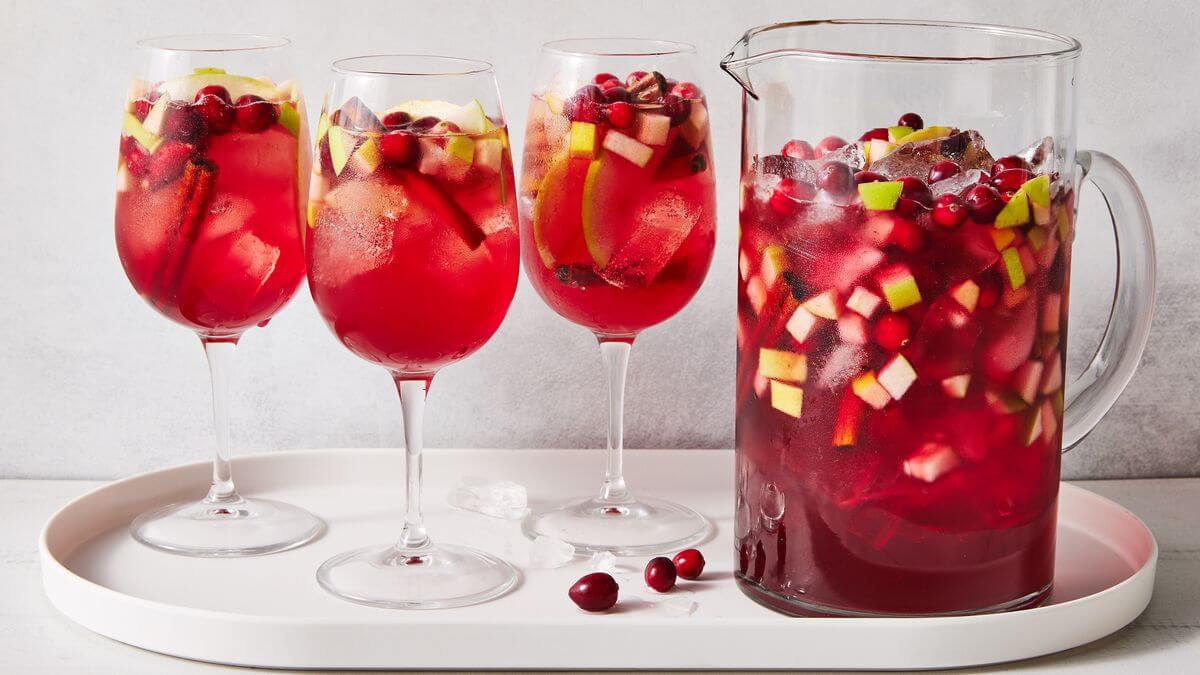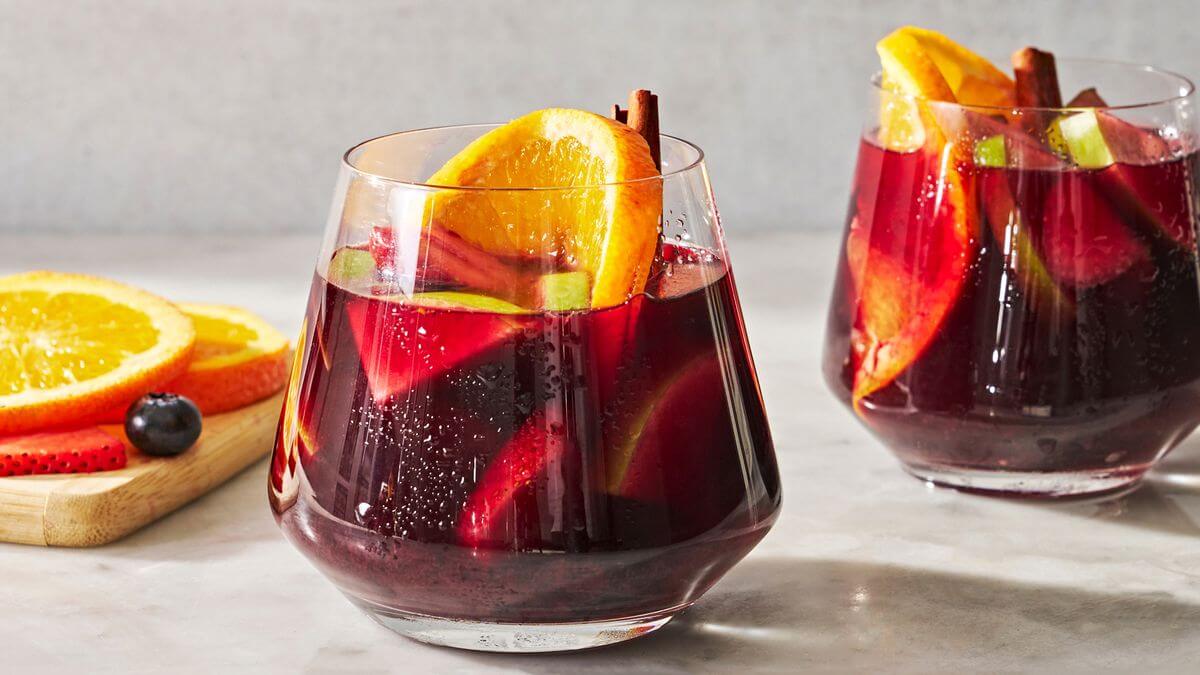As the warm weather approaches, nothing quite quenches thirst like a refreshing glass of sangria.
This delightful Spanish wine cocktail has captured the hearts (and taste buds) of many with its fruity flavors and vibrant hues. But beyond its delicious appeal, you might be wondering: is sangria good for you?
The good news is that sangria can offer potential health benefits, thanks to its antioxidant-rich ingredients. However, as with any alcoholic beverage, moderation is key.
In this article, we’ll explore the potential upsides of sipping on sangria and how to enjoy it responsibly.
What Is Sangria?
Before diving into the health aspects, let’s first understand what sangria is.
Sangria isn’t a specific type of wine; rather, it’s a wine-based beverage that combines the delicious fruit-forward elements of wine with other ingredients.

The basic components of traditional sangria include:
- Red wine (traditionally): Look for Spanish red wines like Rioja or other Tempranillo-based varieties.
- Sweetener: Often in the form of simple syrup or fruit juices.
- Liqueur: Such as triple sec or Cointreau.
- Fruit: Commonly oranges, lemons, apples, and berries.
- Non-alcoholic mixer: Usually soda water or lemon-lime soda.
You can also find variations using white wine, rosé, or even sparkling wine, allowing for endless creativity in crafting this refreshing concoction.
The Antioxidant Power of Sangria
One of the primary reasons sangria is considered a healthy choice is its antioxidant content.
Both red wine and the fruits used in sangria are rich in these powerful compounds, which can help fight off free radicals and reduce oxidative stress in the body.
Let’s take a closer look at the antioxidant sources in sangria:
- Red Wine: Red wine contains polyphenols like quercetin and epicatechin, which have anti-aging effects and may help protect against various health conditions.
- Fruits: The fruits commonly used in sangria, such as oranges, lemons, apples, and berries, provide a variety of antioxidants like vitamin C, vitamin E, beta-carotene, and anthocyanins (abundant in berries).
These antioxidants work together to potentially offer a range of health benefits, including:
- Oxidative stress protection
- Heart health enhancement
- Promotion of lifespan
- Enhanced digestive function
- Strengthened immune response
- Neurological well-being
- Improved bone strength
- Improved renal function
- Skin health promotion
- Decreased stroke risk
- Inflammation reduction
Potential Health Benefits of Sangria
Now that we’ve explored the antioxidant power of sangria, let’s delve into some specific potential health benefits associated with this refreshing libation.

Heart Health
One of the most well-known benefits of red wine is its potential to support heart health.
The antioxidants found in sangria, particularly flavonoids, and resveratrol, may help reduce the risk of heart disease and stroke by lowering inflammation and oxidative stress.
Additionally, the fiber and vitamins from the fruits used in sangria can contribute to overall heart protection by helping to lower cholesterol levels.
Liver Protection
Believe it or not, moderate consumption of sangria may also benefit your liver health. The antioxidants in red wine, such as flavonoids and resveratrol, can help protect liver cells from damage caused by free radicals.
Some studies suggest that moderate red wine consumption may reduce the risk of fatty liver disease and improve liver function.
However, it’s important to note that excessive alcohol intake can harm the liver, so moderation is key.
Skin Health
The antioxidants in sangria can also contribute to healthier, more radiant skin.
The polyphenols and flavonoids found in red wine have anti-inflammatory properties, which can help reduce inflammation and promote an even complexion.

Additionally, the vitamin C found in citrus fruits used in sangria plays a crucial role in collagen synthesis, which is essential for maintaining skin elasticity and preventing wrinkles.
Immune System Boost
The antioxidants in sangria can also support a robust immune system, helping your body fight off infections and maintain overall well-being. A strong immune system is essential for healthy skin and overall health.
Blood Pressure Regulation
While excessive alcohol consumption can raise blood pressure, moderate red wine consumption may have a neutral or even beneficial effect on blood pressure levels.
The antioxidants in red wine, particularly resveratrol, have been shown to have potential blood pressure-lowering effects.
However, it’s important to note that individual responses to alcohol can vary, and those with hypertension or other health conditions should consult with a healthcare professional before consuming alcoholic beverages.
Cholesterol Management
Interestingly, moderate red wine consumption may also play a role in cholesterol management.
The antioxidants found in red wine, along with the fiber and vitamins from the fruits used in sangria, can help maintain healthy cholesterol levels.

However, it’s crucial to remember that excessive alcohol consumption can have the opposite effect and contribute to an increase in cholesterol levels.
Is Sangria Good for Weight Loss?
Sangria itself isn’t inherently good or bad for weight loss. It depends on the recipe and portion size.
A typical serving can range from 120 to 250 calories, but there are lower-calorie options available that use natural sweeteners and seltzer instead of sugary juices.
Moderation is key, so enjoy sangria occasionally as part of a balanced diet.
Enjoying Sangria Responsibly
While sangria offers potential health benefits, it’s essential to enjoy it in moderation.
Excessive alcohol consumption can lead to adverse effects on your health, including liver damage, addiction, and an increased risk of certain cancers.
Here are some tips for enjoying sangria responsibly:
- Portion Control: Stick to a single serving of sangria, which is typically around 4-6 ounces.
- Hydrate: Drink plenty of water before, during, and after consuming sangria to stay hydrated.
- Eat First: Consume sangria with a meal or snack to slow the absorption of alcohol into your bloodstream.
- Opt for Quality Ingredients: Choose high-quality red wine and fresh, ripe fruits for your sangria to maximize its antioxidant content.
- Avoid Overindulging: Be mindful of your alcohol consumption and know your limits.
Remember, while sangria can be a delightful treat, moderation, and balance are essential for reaping its potential health benefits.
Conclusion
In conclusion, sangria can be a refreshing and potentially healthy addition to your summer beverage repertoire.
With its antioxidant-rich ingredients, including red wine and various fruits, sangria offers potential benefits for heart health, liver protection, skin health, immune system support, and more.
However, it’s crucial to remember that moderation is key when it comes to consuming alcoholic beverages like sangria. Excessive alcohol consumption can outweigh any potential benefits and lead to adverse health effects.

